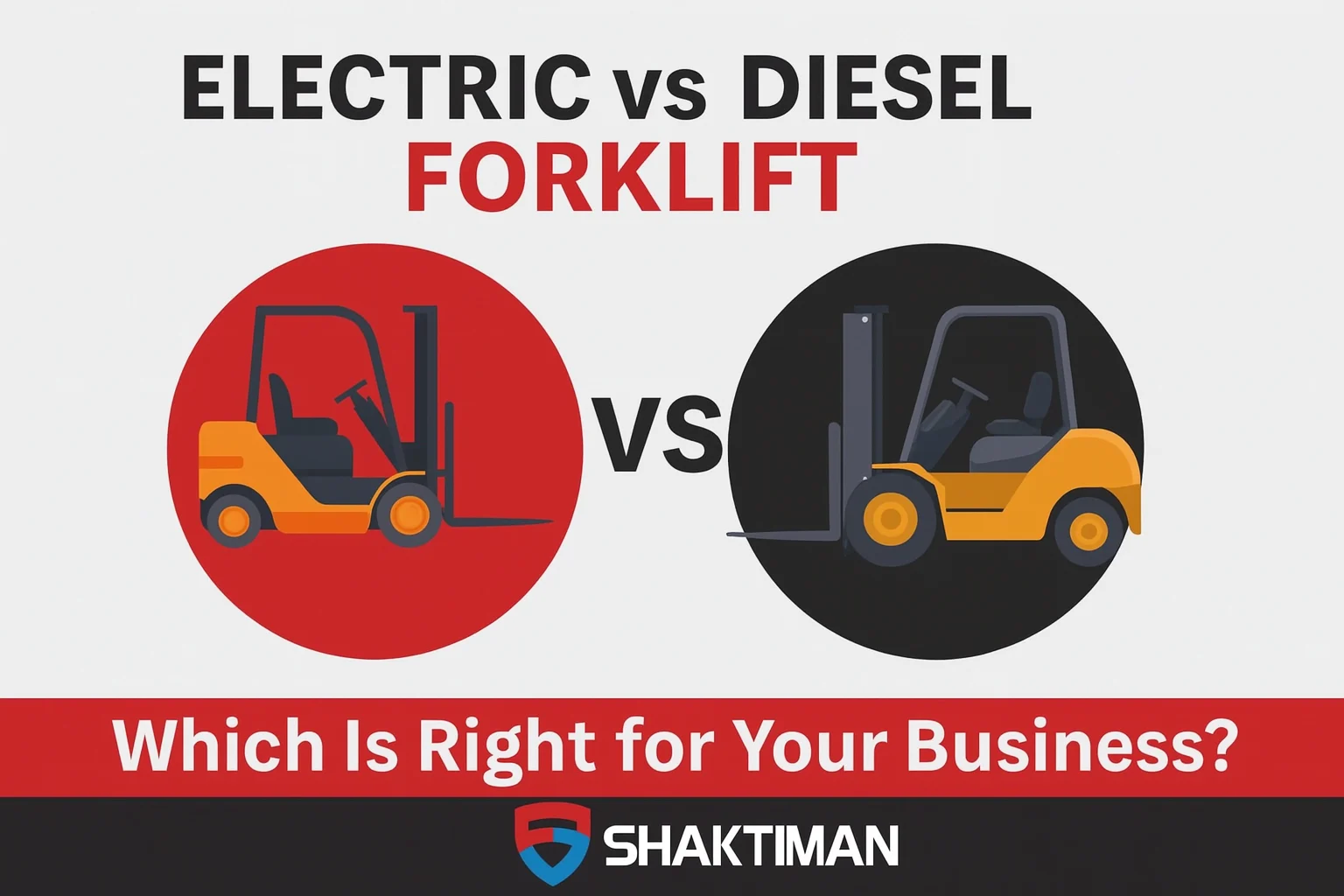Introduction
Choosing the right material-handling equipment is crucial for maximizing productivity, reducing operating costs, and ensuring workplace safety. Among the most debated choices is the comparison between electric vs diesel forklifts.
Both types offer unique advantages, and the right choice depends on factors such as usage environment, load requirements, cost considerations, and long-term operational goals.
This detailed guide breaks down everything you need to know—performance, safety, environmental impact, maintenance, ROI, and real-world use cases—to help you make a confident, informed decision.
What Is an Electric Forklift?
Electric forklifts run entirely on rechargeable industrial batteries. They are widely used in warehouses, retail distribution centers, cold storage facilities, and indoor manufacturing units. Their popularity has grown due to their low operating cost, quiet performance, and zero emissions.
What Is a Diesel Forklift?
Diesel forklifts are powered by diesel engines and are known for their strength, torque, and reliability in outdoor and heavy-duty environments. These machines are ideal for industries that require high lifting capacity, rough-terrain navigation, and long continuous operation.
Key Differences Between Electric and Diesel Forklifts
Power & Performance
Electric Forklifts
Electric forklifts deliver smooth acceleration and precise control, making them ideal for tight indoor spaces. Their torque is instant, which helps in efficient pallet handling.
However, they may struggle in extreme weather or on uneven outdoor surfaces.
Diesel Forklifts
Diesel forklifts offer superior power, higher torque, and better performance on rough terrain. They are designed for continuous outdoor usage and heavy loads.
Winner: Diesel forklifts for power, electric forklifts for precision and indoor use.
Operating Cost
Electric Forklifts
- Lower cost per hour of use
- No fuel charges
- Fewer moving parts = reduced maintenance
- Battery replacement every 4–5 years is a major expense
Diesel Forklifts
- Higher fuel cost
- Higher maintenance (engine, oil, filters)
- Longer lifespan in harsh outdoor conditions
Winner: Electric forklifts offer lower operating costs long-term.
Environmental Impact
Electric Forklifts
- Zero emissions
- No fumes, ideal for food & pharmaceutical warehouses
- Quiet operation
- Supports sustainability goals
Diesel Forklifts
- Emits smoke and CO₂
- High noise levels
- Restricted in indoor environments
Winner: Electric forklifts clearly lead in environmental performance.
Load Capacity
Electric Forklifts
- Suitable for light to medium loads (1–3 tons commonly)
- Some models reach 5 tons
Diesel Forklifts
- Designed for medium to heavy loads
- Can exceed 10+ tons for industrial applications
Winner: Diesel forklifts dominate in load capacity.
Noise Levels
Electric Forklifts
- Nearly silent
- Reduces operator fatigue
Diesel Forklifts
- Noisy engine
- May require ear protection in some areas
Winner: Electric forklifts.
Maintenance Requirements
Electric Forklifts
- No engine components
- Minimal maintenance
- Battery care is important
Diesel Forklifts
- Regular oil services
- More parts to maintain
- More downtime
Winner: Electric forklifts need less maintenance.
Pros & Cons — Electric vs Diesel Forklift
| Feature | Electric Forklift | Diesel Forklift |
|---|---|---|
| Power | Moderate | Very High |
| Operating Cost | Low | High |
| Environment | Zero-emission | High emissions |
| Noise | Very Low | High |
| Load Capacity | Medium | High |
| Maintenance | Low | High |
| Indoor Use | Excellent | Restricted |
| Outdoor Use | Limited | Excellent |
Cost Comparison: Purchase, Fuel, and Maintenance
Upfront Cost
- Electric forklifts cost more due to batteries
- Diesel forklifts cost less initially
Fuel/Energy Cost
- Electricity is cheaper than diesel
- Diesel prices fluctuate
Maintenance Cost
- Electric: low
- Diesel: high
Long-Term ROI
Electric forklifts typically offer better ROI for businesses with high-hour indoor operations.
Safety Considerations
Electric Forklifts
- No exhaust fumes
- Reduced fire hazard
- Better visibility (no bulky engine)
Diesel Forklifts
- Must operate in ventilated areas
- Higher risk of fire due to fuel
- Requires operator protection equipment
Productivity & Efficiency Comparison
Electric Forklifts
- Great for tight spaces
- Recharge time required
- Opportunity charging helps during breaks
Diesel Forklifts
- Can run continuously
- Quick refueling
- Best for long outdoor shifts
Electric vs Diesel Forklift: Best Use by Industry
Industry | Recommended Type |
Warehousing | Electric |
FMCG | Electric |
Cold Storage | Electric |
Manufacturing | Both |
Construction | Diesel |
Logistics Yards | Diesel |
Ports | Diesel |
People Also Ask (PAA) – Expert Answers
Final Recommendation
Choose Electric forklifts if:
✔ You operate mainly indoors
✔ You want low operating costs
✔ You need a quiet, clean, and efficient machine
✔ You handle light to medium loads
Choose Diesel forklifts if:
✔ You operate outdoors
✔ You require high lifting power
✔ You work on rough terrain
✔ You need long, uninterrupted operation
FAQ
Conclusion
When comparing electric vs diesel forklifts, the best choice depends on your operational environment, usage pattern, load demands, and budget. Electric forklifts offer cleaner, quieter, and more cost-efficient performance for indoor facilities. Meanwhile, diesel forklifts remain the preferred choice for heavy lifting, outdoor operations, and rugged environments.
By analyzing cost, performance, safety, and environmental factors, you can make a strategic decision that improves your business efficiency and long-term ROI.


